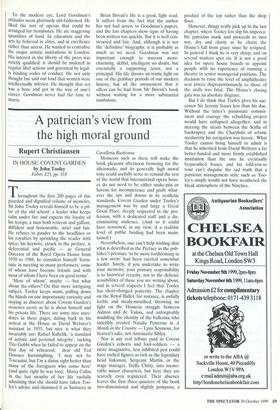A patrician's view from the high moral ground
Rupert Christiansen IN HOUSE: COVENT GARDEN by John Tooley Faber, £25, pp. 318 Throughout the first 200 pages of this guarded and dignified volume of memoirs, Sir John Tooley reveals himself to be a pil- lar of the old school: a leader who keeps calm under fire and expects the loyalty of his troops, a man both reticent and gallant, diffident and honourable, strict and fair. He refuses to pander to the headlines or his royalties by sprinkling the reader with spice; his keynote, struck in the preface, is deferential and pacific — as General Director of the Royal Opera House from 1970 to 1988, he considers himself 'fortu- nate in meeting so many performers, some of whom have become friends and with most of whom I have been on good terms'.
`Most of whom', maybe — but what about the others? On that more intriguing subject, Tooley keeps mum, pulling down the blinds on our importunate curiosity and staying as discreet about Covent Garden's monstres sacra as he is about himself and his private life. There are some nice anec- dotes in these pages, dating back to his arrival at the House as David Webster's assistant in 1955, but nice is what they invariably are: Rafael Kubelik, 'a standard of artistic and personal integrity', sacking Tito Gobbi when he failed to appear on the
first day of rehearsal; dear old Ted Downes harrumphing, 'I may not be Toscanini, but I'm a damn sight better than many of the foreigners who come here' (and quite right he was too); Maria Callas in the last months of her life ruefully admitting that she should have taken Too- ley's advice and slummed it as Santuzza in Cavalleria Rusticana.
Moments such as these will make the book pleasant afternoon browsing for the aficionado, and its generally high moral tone could usefully serve to remind the rest of the world that international opera hous- es do not need to be either snake-pits or havens for incompetence and graft: what- ever the ups and downs in its aesthetic standards, Covent Garden under Tooley's management was by and large a Great Good Place, deeply respected in the pro- fession, with a dedicated staff and a dis- criminating audience. (And so it could have remained, in my view, if a realistic level of public funding had been main- tained.)
Nevertheless, one can't help wishing that what is described in the Preface as the pub- lisher's pressure `to be more forthcoming in a few areas' had been exerted somewhat harder. Surely, if you undertake to write your memoirs, your primary responsibility is to historical veracity, not to the delicate sensibilities of those you are writing about, and in several respects I feel that Tooley has short-changed posterity. The chapter on the Royal Ballet, for instance, is awfully feeble and mealy-mouthed, throwing no light on the Homeric struggle between Ashton and de Valois, and unforgivably muddling the identity of the ballerina who indelibly created Natalia Petrovna in A Month in the Gonna), — Lynn Seymour, for heaven's sake, not Antoinette Sibley.
Nor is any real tribute paid to Covent Garden's cohorts and foot-soldiers — a more imaginative, less inhibited pen could- have etched figures as rich as the legendary head linksman, Sergeant Martin, or the stage manager, Stella Chitty, into memo- rable minor characters, but here they are scarcely even registered. Their absence leaves the first three-quarters of the book two-dimensional and slightly pompous, a product of the top rather than the shop floor.
However, things really pick up in the last chapter, where Tooley lets slip his impecca- ble patrician mask and proceeds to turn wry, dry and chatty as he charts the House's fall from grace since he resigned. In 'general I think he is very sharp, and on several matters spot on. It is not a good idea for opera house boards to • appoint people with no experience of running a theatre to senior managerial positions. The decision to raise the level of amphitheatre seat prices disproportionately to those of the stalls was fatal. The House's closing gala was an absolute disgrace.
But I do think that Tooley gives his suc- cessor Sir Jeremy Isaacs less than his due. Without the latter's passionate commit- ment and courage the rebuilding project would have collapsed altogether, and in steering the straits between the Scylla of bankruptcy and the Charybdis of artistic mediocrity his navigation was heroic, What Tooley cannot bring himself to admit is that he inherited from David Webster a far better-funded and more firmly established institution than the one he eventually bequeathed Isaacs, and his told-you-so tone can't disguise the sad truth that a patrician management style such as Too- ley's simply would not have weathered the bleak atmosphere of the Nineties.


























































































 Previous page
Previous page